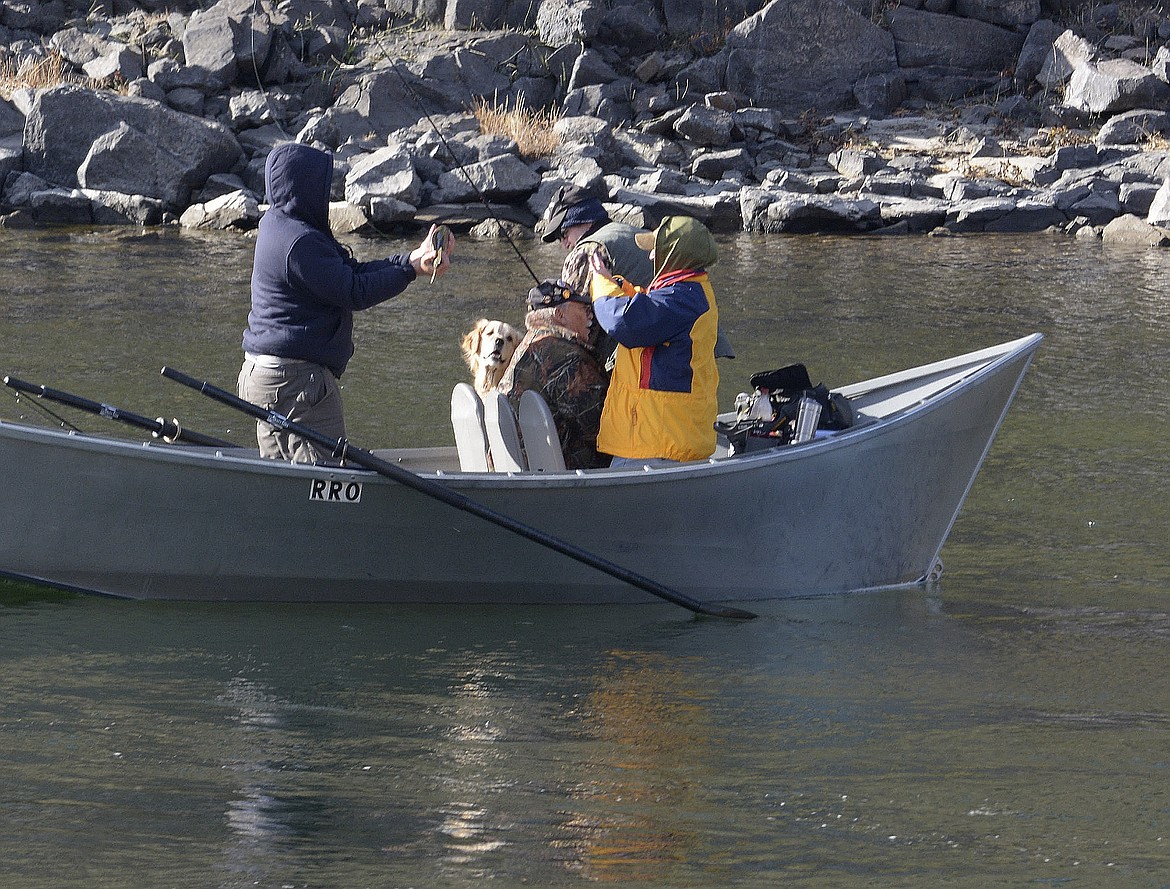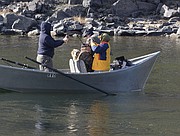Technicality or troubled waters?
There was a time when businesses in Riggins proudly displayed small signs in their storefront windows proclaiming “Salmon Mean Business.”
The campaign to draw attention to the positive financial impacts of healthy salmon and steelhead runs was launched in the early 2000s by conservation groups pushing for breaching the four lower Snake River Dams under the umbrella of the Save Our Wild Salmon Coalition.
It was a time when anadromous fish were flexing their financial muscle. Good ocean conditions led to huge returns of hatchery fish. Anglers flocked to the riverside town and kept cash registers ringing.
That was then. Now Idaho is seeing its lowest steelhead return in a quarter century. Ocean conditions have turned south. Salmon and steelhead runs are on the decline, and the paucity of fish is causing rifts in the marriage of conservation organizations, anglers and fishing businesses.
When the sun goes down on Friday it will also set on Idaho’s normally reliable and lucrative steelhead season. The Idaho Fish and Game Commission decided to end the season in the face of potential litigation from a small collection of conservation groups.
All of the groups are active in conservation, but when it comes to river and fish issues, Idaho Rivers United is the one that people in the Gem State are most familiar with. The group, which rescinded its lawsuit threat Friday but was unable to bring the other potential litigants with it, has been at the forefront of efforts to breach the lower Snake River dams as a way to recover salmon and steelhead. In that endeavor, it has often touted the economic benefits of salmon and steelhead fishing to rural communities like Riggins.
So when the season closure was announced with little or no warning, Idaho Rivers United, along with the Idaho Department of Fish and Game and National Oceanic and Atmospheric Administration Fisheries, was a natural landing point for the angst and anger of both anglers and the businesses that depend on them. Now, there is a bigger sign, placed at the southern entrance to the riverside town, warning those conservation groups and their members they are no longer welcome.
“If you are a member of Idaho Rivers United or any other group trying to kill our town TURN AROUND and GO HOME we don’t want you here,” it proclaims.
“People are frustrated, and people are upset and looking for some direction to lash out,” said Roy Akins, owner of Rapid River Outfitters, a member of the Riggins City Council and chairman of the Idaho River Community Alliance that formed Thursday. “People can’t tell you any other people on the list (of potential litigants) but they all recognized Idaho Rivers United.”
Akins, who has worked with Idaho Rivers United, said there was a sense of betrayal among people who had bought into the idea that the conservation groups and fishing communities were on the same team.
“Up and down Main Street right now that is the overwhelming sense,” Akins said. “We partnered together and felt like we were fighting together for a mutual cause to maintain these communities and give them a livelihood and at the same time fighting for recovery of our salmon and steelhead runs.”
But he also said there could have been a compromise and thinks the state could take some steps to settle the potential lawsuit. Things like forbidding people from removing wild fish from the water, closing some sections of rivers where wild fish congregate and tackle and bait restrictions.
“We could find a million ways to change our practices and even season dates,” he said. “There are lots of things we could have discussed, but we were never allowed to be part of the conversation. It was one of the most frustrating factors.”
‘We are the collateral damage’
Gary Lane, owner of Wapiti River Guides at Riggins, is worried about wild fish and thinks more can be done to reduce incidental mortality. Like Akins, he supports measures such as making anglers use single barbless hooks instead of barbless treble hooks or multiple single hooks on plugs and lures. Lane advocates for leaving wild fish in the water. Idaho, unlike Washington and Oregon, allows anglers who hook and land wild fish to briefly remove them from the water for pictures. Some studies have shown that exposing fish to air before releasing them increases the chances of mortality.
But Lane also said it’s important for the season to be reopened so anglers can catch and remove hatchery fish so those fish don’t have a chance to spawn with wild steelhead. Studies have shown the offspring of wild fish that spawn with hatchery fish are less fit than the offspring of two wild fish. He wishes the conservation groups and the state would have talked longer and arrived at a compromise.
“I think opening the season and compromising on the single barbless hooks and releasing wild fish without taking them out of water would improve things and hopefully cut down on the mortality factor,” he said.
Stubbornness on both sides could hurt Riggins and other fishing communities, he said, and hinder the longer-term prospects of gathering more support for dam breaching, something he says would increase wild fish numbers.
“We are the collateral damage of Fish and Game and the conservation organizations. I don’t think they wanted locals to lose jobs over this, but we ended up being a poker chip. They gambled and shit hit the fan basically,” he said. “It’s too bad the groups ended up alienating a lot of people when we should be on the same side, fighting for the same thing.”
Idaho Fish and Game officials rejected actions like banning treble hooks, bait and briefly removing wild fish from the water as unnecessary and potentially precedent setting. They viewed them as favoring one fishing faction against another and not needed for conservation.
“They really wanted to change the way we fish in Idaho,” said Ed Schriever, Idaho Fish and Game deputy director.
Dissension in the ranks
The threat of litigation and the decision to close the season are also making waves among conservation groups both within Idaho and across the Northwest. Several groups not involved in the notice of intent to sue have politely distanced themselves from those who participated — if not throwing them under the bus, at least nudging them in that direction.
After the season suspension was announced, the Idaho Conservation League issued a statement making clear it was not involved and did not support the move.
“I don’t want to throw them under the bus, but at same time I think it’s very important to say I think our colleagues handled this poorly, just like I think Idaho Fish and Game handled this poorly,” said Justin Hayes, Idaho Conservation League program director.
Hayes said the move threatens to cleave conservation groups and anglers apart in their mutual effort to protect and restore not only fish runs but the rivers and habitat that support them.
“It has the potential to damage just the ability of the conservation community to work with the fishing community. I think we have been partners for years in trying to point out what is happening with salmon and trying to point out solutions, and this can set that back,” he said. “It’s a terrible thing, and obviously it’s a terrible thing for the fishing families caught up in the middle of this. It does short-term damage to their families and lives and does long-term damage for Idaho’s ability to move forward and restore salmon.”
Liz Hamilton, executive director of the Northwest Sportfishing Industry Association and also a member of the Save Our Wild Salmon Coalition, is critical of the move and its potential to alienate anglers, outfitters and guides, and business owners from conservation causes. Like Hayes, Hamilton was reluctant to criticize the groups but also unwilling to hold her tongue.
“I’m loath to create deeper chasms at a time when the fish need our best,” she said. “I just don’t think this helps our efforts. I know many of these groups are well-meaning. I think we all want the same thing, but to take an approach that divides us instead of unites us — the conservationists and the sport fishers are almost an intersection. They are so closely related, and things like this make it seem like they are not.”
Boise State University political scientist John Freemuth, who concentrates on natural resource politics, said there are few issues that bring together diverse camps like conservationists, anglers, hunters, hikers and outdoor lovers in general. Potential state or private takeover of federal public lands is one, salmon and steelhead recovery is another.
“It forces sportsmen and environmentalists further away, or it can,” Freemuth said. “You hope it’s like a pendulum, and everybody takes a breath and says we can’t win by trying to defeat the other guy.”
Fighting over scraps
Kevin Lewis, executive director of Idaho Rivers United, said his group and others do want the same things as members of fishing communities like Riggins and that his organization has been fighting to improve Idaho’s salmon and steelhead runs for more than 20 years.
“Unfortunately what gets lost in this process are the bigger issues at stake here, such as we don’t get enough salmon and steelhead back to Idaho. That is the problem here. If we had real runs of salmon and steelhead, there would be no concern about fishing seasons and hooking mortality and all of the sorts of concerns people get wound up in in times where there is less and less fish. We can’t lose sight of the big picture that we don’t get enough salmon and steelhead back to Idaho. It’s the elephant in the room — the Snake River dams. They are the cause of Idaho’s problems.”
Many conservation leaders believe the current drama is centered on the depressed state of the steelhead run and that bold actions such as increased spill and breaching the four lower Snake River dams is the most viable solution.
“Although this is a very real struggle that is happening right now, we are fighting because of the scarcity of fish. The fish are doing so poorly that we are fighting over the scraps of what should be a much bigger fishery in Idaho,” Hayes said. “I think we have to acknowledge the fish are really in a dire situation numerically, so a lot of options are shut off for people who care about fish, so we turn inward and are shooting at each other instead of unifying and aiming downstream.”
Akins is pleased that Idaho Rivers United reversed course, and he is hopeful others will follow and that any wounds can be healed.
“Ultimately the fishing communities and these groups have the same agenda — more fish in our rivers and sustainable runs of wild fish,” he said. “We look forward to working with them once again in the ultimate goal of working for the recovery of wild salmon and steelhead runs in Idaho.”





